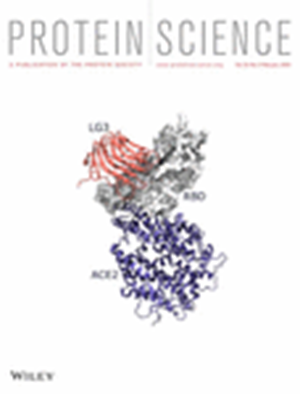MeCP2 is a naturally supercharged protein with cell membrane transduction capabilities
IF 5.2
3区 生物学
Q1 BIOCHEMISTRY & MOLECULAR BIOLOGY
引用次数: 0
Abstract
The intrinsically disordered protein MeCP2 is a global transcriptional regulator encoded by theMeCP2 是一种具有细胞膜传导能力的天然超荷蛋白
内在无序蛋白 MeCP2 是由 MECP2 基因编码的一种全球性转录调节因子。尽管 MeCP2 的结构域已成为多项研究的主题,但其非结构区域的特性还没有得到广泛的研究。在这项研究中,我们发现 MeCP2 具有类似于超荷蛋白的特性。通过利用其非结构化部分,MeCP2 可以成功地穿过细胞膜并定位到细胞核中的异染色质病灶,其吸收水平比融合了细胞穿透肽 TAT 的 MeCP2 构建物低三分之一。通过添加能促进内质体逃逸的化合物,MeCP2 的摄取量会在细胞通过大分子吞噬作用转运后进一步提高。结合使用硅学预测算法和活细胞成像实验,我们绘制出了MeCP2中负责将其纳入细胞的序列,该序列与TAT本身极为相似。转导的 MeCP2 与 HDAC3 相互作用。这些发现为我们深入了解MeCP2的特性提供了宝贵的信息,并可能有助于设计未来基于蛋白质的治疗策略。
本文章由计算机程序翻译,如有差异,请以英文原文为准。
求助全文
约1分钟内获得全文
求助全文
来源期刊

Protein Science
生物-生化与分子生物学
CiteScore
12.40
自引率
1.20%
发文量
246
审稿时长
1 months
期刊介绍:
Protein Science, the flagship journal of The Protein Society, is a publication that focuses on advancing fundamental knowledge in the field of protein molecules. The journal welcomes original reports and review articles that contribute to our understanding of protein function, structure, folding, design, and evolution.
Additionally, Protein Science encourages papers that explore the applications of protein science in various areas such as therapeutics, protein-based biomaterials, bionanotechnology, synthetic biology, and bioelectronics.
The journal accepts manuscript submissions in any suitable format for review, with the requirement of converting the manuscript to journal-style format only upon acceptance for publication.
Protein Science is indexed and abstracted in numerous databases, including the Agricultural & Environmental Science Database (ProQuest), Biological Science Database (ProQuest), CAS: Chemical Abstracts Service (ACS), Embase (Elsevier), Health & Medical Collection (ProQuest), Health Research Premium Collection (ProQuest), Materials Science & Engineering Database (ProQuest), MEDLINE/PubMed (NLM), Natural Science Collection (ProQuest), and SciTech Premium Collection (ProQuest).
 求助内容:
求助内容: 应助结果提醒方式:
应助结果提醒方式:


